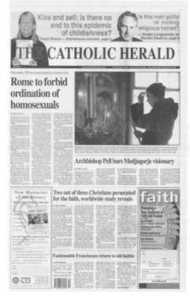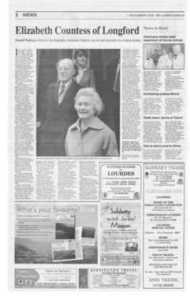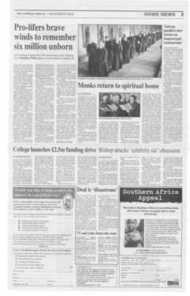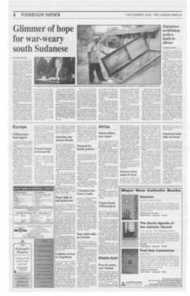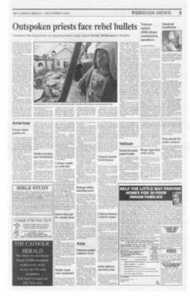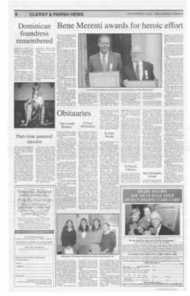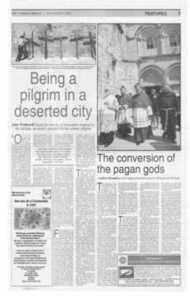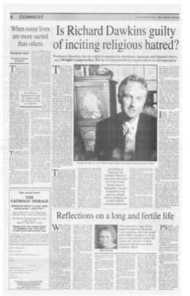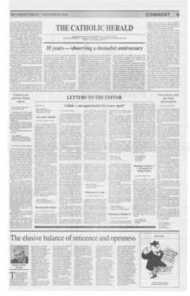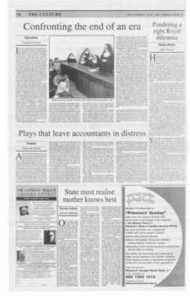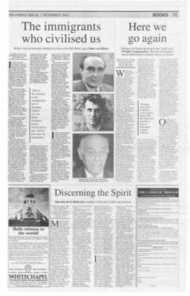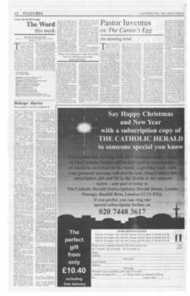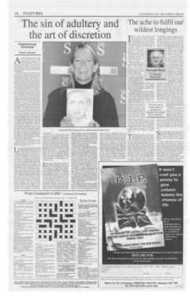Page 8, 1st November 2002
Page 8

Report an error
Noticed an error on this page?If you've noticed an error in this article please click here to report it.
Tags
Share
Related articles
Ortion: Human Issue Or Moral Dilemma
The Unbending Faith Of The Iron Lady
Confusion Over Aids As A Heterosexual Disease
Controversial Labour Mp
New Destiny Of A Contrary Woman Loo Occupied With Other...
Reflections on a long and fertile life
Mary Kenny
When a Methodist friend of mine became engaged to a Catholic, her mother warned her that she would be forced to have a big family. "These RCs," her mum said darkly, "They breed like rabbits!" And since most people now seem to think that a big family is a burden and a nuisance, her mother strongly advised her to break off the engagement.
Yet when we look at the life of Elizabeth, Lady Longford — who has just died at the age of 96 — we have before us the shining example of a woman whose large family has been of immense benefit to society. And whose beauty and fruitfulness in no way impaired her achievements as a historian and biographer; and who was as fulfilled as an intellectual as she was as a wife and mother.
Far from being "rabbits" Lady Longford's children turned out to be talented, attractive, interesting and nice. She had four daughters and four sons, and the great sadness of her life was the loss of her daughter Catherine in a car accident in 1969. (Thomas Pakenham, the eldest son, first heard the news on the radio but only as "Lord and Lady Longford's daughter has died in a road accident". For three hours he had to endure the anguish of not knowing which of his four sisters had died.) And yet, in facing this bereavement, the Longford family had, at least, the comfort and solidarity that a large family can provide. They accepted their loss with fortitude and went on to establish the Catherine Pakenham Award for young women journalists, which has flourished ever since.
Elizabeth Longford, who was a convert — originally her family were Baptists — clearly loved having children. When she had six children, she sought a Parliamentary seat for the Labour Party, and she was asked by the selection committee to promise that she would not become pregnant again. What a cheek! And a typical example of that hostility to motherhood. Why shouldn't a woman have as many children as she likes? A capable and healthy woman, providing she has the back-up care, can run a large family and a demanding vocation perfectly well. Elizabeth Fry, the great prison reformer, was the mother of 10 and Lady Butler, one of the finest of military painters, gave birth to seven.
As it turned out, Parliament's loss was history's gain, and Lady Longford went on to write several outstanding biographies, starting in her 50s.
She also set an excellent working example to her children, four of whom have become illustrious authors. (Two of her sons are in the professions and one is the Ambassador to Poland).
I feel sure that growing up in a big family helped to make the Pakenham brood outgoing, easy with people and wholesomely competitive. Despite their links with the landed gentry they are completely without the pretentious airs and graces that are sometimes associated with their class. Again, being part of a large family knocks the corners off: you have to learn about give and take and about relating to others.
No doubt the Pakenhams, like all families, have their sibling rivalries and discontents.
And Frank and Elizabeth, although adorable parents, could occasionally be absentminded. Lord Longford determined to send Thomas to Belvedere College in Dublin because he had been told it was such a fine Jesuit school. Only a week before the commencement of term did he realise that it was not a boarding school. So Tom, aged 12, had to live in Dublin lodgings while attending Belvedere as a day boy.
Elizabeth Longford would be rightly praised and remembered as an outstanding writer and historian but she should also be honoured as a matriarch who, with her husband, founded a remarkable dynasty; a Christian family who had their failings, as we all have, but who carry forward the values of culture and spirituality that Elizabeth, their mother, established.
psSuicide has tr ip led among young men over the past two decades and our response to this terrible 'epidemic is to offer more caring services. But each time I meet a train driver I can't help reflecting on the terrible fall-out to others that suicide sometimes entails.
I talked to a young woman train driver this week who spoke compellingly about the awful problem of people throwing themselves under trains.
"About 70 per cent of my colleagues have had a suicide jumping in front of the train. Drivers are horrified by it, and some never recover from the trauma."
One young colleague of hers, also a woman train operator, was turned into a nervous wreck when a young man threw himself beneath the wheels of her train. The driver had to appear in court, face cross examination and sometimes the hostility of the bereaved who somehow blame the train driver for their loss. This is a distressing an unexplored aspect of suicide which proves once again that the action also dreadfully damages other people.
blog comments powered by Disqus


